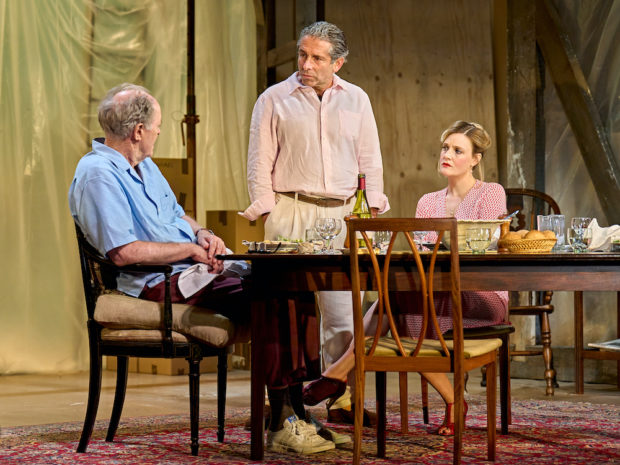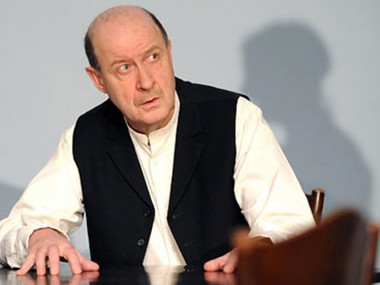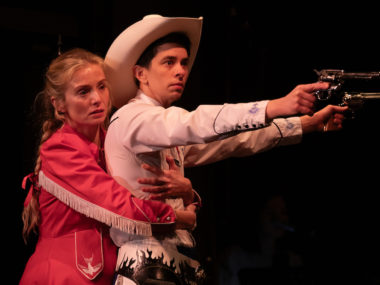Giant, Royal Court
Thursday 26th September 2024

Roald Dahl evokes mixed feelings. He’s one of the greatest children’s storytellers, whose macabre books have sold hundreds of millions of copies worldwide; he was also anti-Semitic, and used racist and sexist stereotypes in his work. So despite the huge theatrical success of the musicals Matilda, Charlie and the Chocolate Factory and The Witches, Dahl exudes a very unpleasant personal vibe. It is this that is the subject of director Mark Rosenblatt’s debut play, Giant, which is staged by Nicholas Hytner and has an excellent cast headed by 3rd Rock from the Sun’s John Lithgow, plus Romola Garai and Rachael Stirling. But can these stars make Dahl palatable?
The plot, which is set in the sitting room of Gipsy House, Dahl’s family home in Great Missenden, takes place in the summer of 1983. Dust hangs in the air as builders undertake a huge refurbishment of the place. Dahl’s new book, The Witches, is about to be published, but the 67-year-old author is unwell, and he is discussing Quentin Blake’s illustrations with Tom Maschler, his British publisher. Typically, Dahl is bad tempered, which puts a strain on Liccy, his long-time lover and, since his divorce, his fiancée. They are all expecting the arrival of Jessie Stone, sales director of Dahl’s American publisher, because a crisis has blown up over a magazine article written by Dahl.
This Literary Review piece is a review of Tony Clifton’s God Cried, a photographic account of the siege of West Beirut by the Israeli army during the 1982 Lebanon War. Tom and Jessie’s problem is that Dahl’s article includes blatantly anti-Semitic statements, equating Israel’s actions with the Jewish people everywhere. Fearing that this will affect sales of his work, and conscious of the damage to the writer’s reputation, his publishers want him to make a public apology. But Dahl, being Dahl, doesn’t want to back down. Rosenblatt turns up the temperature of this fictional account of a true story by inventing the Jessie character and making her a practicing American Jew. Appalled not only by Dahl’s article, but also by his provocative behaviour, she insists on an apology — with dramatic consequences for all involved.
The relevance of Giant, whose title refers to his inflated sense of self and also echoes, with irony, Dahl’s 1982 book The BFG (The Big Friendly Giant), today is obvious. The play has opened in the week when Israel is once again engaged in a war with the Lebanese Hezbollah, as well as with the Palestinian Hamas, and the heated discussions of anti-Semitism reflect current controversies. While reason argues that any killing of hundreds of civilians, by either side, is wrong, the temptation to grade such events by the number killed (the more, the worse) is strong, and Rosenblatt includes a powerful moment when Dahl details the atrocities committed by the Israeli army. But his inability to distinguish between Israeli state actions and the Jewish people, as a “race”, is a vile example of anti-Semitism. So Jessie’s passionate demand for an apology gives the play a dramatic high.
So far so good. But the strength of Rosenblatt’s play lies in its moral complexity: his Jessie also attacks The Witches as a covert anti-Semitic tract, which suggests a certain fanaticism and, forgive the pun, a witch-hunting mentality. She is also revealed to be morally compromised personally, while Dahl is shown to eventually treat her, in one important passage, with enormous empathy as regards her family problems. Likewise, Tom is shown to be capable of moral compromise in his role as publisher of the profitable author. Less sullied are Liccy and Hallie, the couple’s New Zealand cook, although Wally, the elderly handyman, seems to support Dahl’s more obnoxious attitudes. Men, eh?
The play makes clear, however, that Dahl’s redeeming features are less significant than his revolting attitudes to Jewish people. These are difficult to listen to, a situation exacerbated by the fact that today they are to be found everywhere. Rosenblatt correctly represents Dahl as he really was, a deeply difficult, deeply unpleasant individual, yet deeply creative too — which raises familiar questions about the relationship between nasty artists and their work. We enjoy the genius of the work, while constantly remembering the awfulness of their creators. It’s impressive that Rosenblatt refuses to simply these difficult issues, even when it’s clear where he stands.
The dramaturgical problem with Giant is that it is an old-fashioned play of ideas, which makes it an awkward fit in this venue (which used to promote new writing rather than the 1970s style of debate drama). The characters have set speeches in which they set out their views, with very few occasions of lively dialogue. This gains in clarity what it loses in realism, but what’s missing is any sense of an individual writerly voice. That said, a West End transfer of this play would help the Royal Court’s finances, which is exactly the kind of commercial consideration that nestles in the heart of this story. And who of us can really ignore the financial realties of life today?
Rosenblatt’s technique is like breathing in and out: first intensify the drama, then relax the action, then intensify, then relax again (for an event that lasts part of one afternoon there’s a lot of characters coming in and going out again). But the writing contains a lot of strong lines, some good jokes (especially one about an avocado), an acute analysis of Dahl’s review and enough ugly examples of anti-Semitism — comparing Israel to Nazi Germany — to make the audience gasp out loud. Of course, the most shocking phrases are verbatim quotes by him (though artfully edited and arranged). For balance, there are passionate moments of support for the Palestinians. Tom, who is also Jewish, appreciates Dahl’s work and never lets the writer’s unsavoury attitudes be his only defining feature.
Nicholas Hytner, making his Royal Court debut, has been instrumental in bringing the play to the stage and his production, designed with loving naturalism by Bob Crowley, is well paced and well cast. American actor John Lithgow not only looks a bit like Dahl, but turns in a detailed performance, switching (like his maddening character) from impish mischief to tender sympathy, from intelligent questioning to bullyboy aggression. At various points, you can glimpse the child in the adult Dahl. As so often, it’s hard to despise a nasty person when they are played so charismatically, with unacceptable attitudes softened by charm and gentleness. It is one of Rosenblatt’s impressive achievements that he keeps reminding us of how unpalatable Dahl was.
Against this master of discomfort Romola Garai’s Jessie makes the journey from being awkwardly intimidated by his reputation to challenging his views and opinions, from self control to fiery, voice-trembling passion. In a different key, Elliot Levey’s Tom tries to contest the writer’s excesses while retaining his own cool, all the time suggesting an even more complex understanding of what it means to be Jewish (his real-life character left Nazi Germany as a child). Caught in between the moral choices the others are making is Rachael Stirling’s Liccy, trying to keep the peace and to secure her own future with the irascible Dahl. Tessa Bonham Jones and Richard Hope lend good support as Hallie and Wally.
If the staging of Giant is partly a gesture of atonement by the Royal Court for its own anti-Semitic blunder in 2021 with Rare Earth Mettle, it also takes place in the context of current anxieties about the Middle-East conflicts. The recent cancellation of A Midsummer Night’s Dream by the Manchester Royal Exchange theatre because of some added content that expresses support for a free Palestine illustrates the difficulty of such intractable issues. So Rosenblatt’s play, and Hytner’s production, is challenging, brave, thought-provoking — and the most intensely interesting play currently on the London stage. It simply cries out for a West End transfer.
This review first appeared on The Theatre Times



